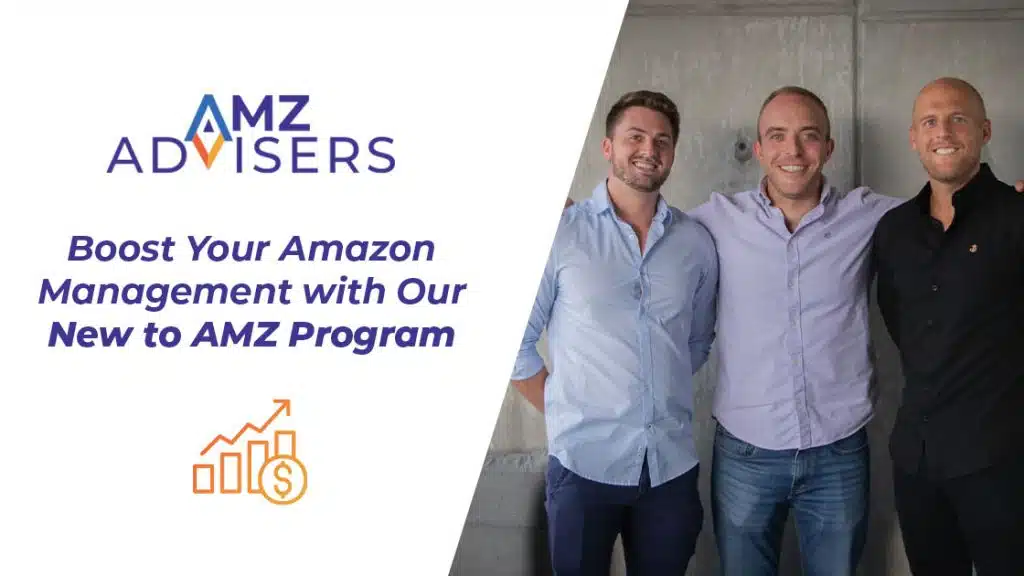Investors seeking new opportunities are turning there attention more and more to Amazon.com, Inc. (“Amazon”) FBA Businesses. And who can blame them? Jeff Bezos recently announced that third party sellers brought in $160 billion in gross merchandise sales in 2018 – almost 60% of total Amazon sales. The opportunities are there. However, there are some things you need to look for when buying an Amazon FBA business.
We’ve seen our share of investor nightmares at AMZ Advisers. Too many investors are getting burned on bad deals because they don’t know what to look for.
The Process
Completing a purchase of an FBA business is a straightforward process. There are numerous platforms that you can buy an FBA business on. Once you find a business you are interested in, you contact the seller and try to negotiate a purchase price to get the business under contract. The contract should include a period for due diligence. It should also allow the buyer to walk away from the deal or renegotiate the purchase price if due diligence turns up issues with the business.
How does eCommerce Due Diligence work?
Being diligent when buying and eCommerce business is no different then when buying a physical asset, like a store or piece of real estate. You need to look into all the aspects that could affect the business. The problem is that many first-time buyers of Amazon FBA businesses don’t know what to look for. The Amazon platform is complex and understanding the Amazon A9 algorithm is important. Essentially, the algorithm is influenced most heavily by sales velocity and conversion rates. There are many different ways that Amazon Sellers can influence those metrics both on the Amazon platform and off of it.
Of course, you also want to do more traditional due diligence as well. You will need to review contracts, agreements, accounting records and historical sales numbers. There are many Amazon business brokers that can help you navigate the process. Utilizing someone who understand that Amazon platform and the purchasing and selling of Amazon businesses like us can make the entire process much smoother.
The Due Diligence Checklist for Buying an Amazon FBA Business
There are a few Due Diligence points that you need to cover before buying an Amazon FBA business. Diving deep into these topics should help you flush out any problems with the business. These are the main points we focus on when we have bought businesses in the past, and how we advise our clients to proceed.
- Accounting Records
Most businesses will operate with a digital accounting service such as Quickbooks or Xero. This should make it pretty simple to provide you with the historical accounting records for the Amazon FBA business. We would recommend getting access to their accounting service to review the records. You want them to ensure that all the accounts are set-up correctly and the number the valuation is being based off is accurate.
One of the things they will need to look at is how the sales tax is accounted for. Currently, Amazon sellers are responsible for remitting sales tax in most states. With the current arrangement, Amazon is remitting the tax collected in the gross paycheck you receive from them. Not including the sales tax as a business expense or moving it to the business taxes line of a pro forma would artificially inflate the businesses valuation.
You may also be alerted to other products or services. Promotional launch services can be a great way to increase your product sales quickly. However, they typically come at a high price point and entail giving away a large amount of inventory.
- Supplier Agreements
Your agreements with manufacturers is probably the most important thing to a successful Amazon FBA business. You should an in-depth look at your supplier agreements to understand what your terms, lead times and unforeseen costs may be. These agreements with manufacturers in other countries are very rarely enforceable or are only enforceable at a high cost to you. That’s why we believe it is always a good idea to speak with the manufacturers before closing any FBA business purchase.
Things to discuss with them on the manufacturing side are the lead times, quantity price breaks, manufacturing standards and material costs. You also need to understand if the supplier agreement is exclusive and they will not sell the product to other buyers. Again, this is very difficult to enforce but it is important to ensure you have a trustworthy supplier.
You also need to consider the shipping side of the process. You will need to know whether you need your own freight forwarder, how the product will be packaged, the shipping terms (FOB vs CIF) and who will handle any customs charges. Working with your own freight forwarder is usually the best way to go to ensure all these points are covered.
We also recommend asking for Safety Data Sheets, GMP certificates and/or Quality Management Systems Certifications. Ensuring that the product meets or exceeds FDA or other regulator standards is important to the survival of the business. You should consider engaging a lawyer who is familiar with regulator standards to review the documents and ensure there are no issues.
- Fees
Amazon charges many different fees to Amazon Sellers. Referral fees range anywhere from 8%-20% of the sales price. These fees are charged on each sale from the Amazon platform. There is also the FBA fee which can be about another 15% for shipping and handling of orders. That fee only applies to products fulfilled from Amazon FBA Centers. Amazon can take up to 35% of your margin before you even get your check.
Make sure that the fees are properly accounted for in the accounting records. Amazon reporting largely focuses on the gross sales numbers and does not include the effective revenue after fees. Exclusion of those fees leads to a highly overvalued business. You can see the transaction data by looking at the payment reports and even estimate fees for related product launches by using the FBA calculator.
- Historic Advertising Data
Getting as much of the advertising history as possible will provide great insight into the main keywords for the product. Amazon only retains advertising data for 90 days, so it is important to see if they have older reports available. The ideal situation is if there are advertising reports from a monthly basis. However, having any reports that detail the advertising over time can be extremely helpful.
What you want to look for is how the campaigns have performed. There are different types of advertising campaigns which can be further enhanced by match and targeting types. Automatic campaigns are good for keyword research so expect to see some of these campaigns set up. Manual campaigns are used for targeting the best converting keywords. A manual campaign could have a variety of objectives.
Most campaigns are for targeting the profitable keywords to drive sales at the lowest-cost possible. Other campaigns could focus on driving sales on a specific keyword to rank for that word. That could mean higher bids, spend and a lower Average Cost of Sale (ACOS).
Look how the advertising costs have been overtime on a campaign level. Increasing ACOS or advertising spend could indicate a competitive advertising environment. You may need to look at other advertising opportunities outside of Amazon to grow the business. The costs of advertising has grown drastically on the platform in the past 2 years and is Amazon’s main source of revenue.
- Promotion History
Analyzing the promotions that an FBA account has run can give you a good idea if they are doing more than just advertising on Amazon. The report is available under the fulfillment reports and provides information on each redeemed promotion. Giving away enough products a low price to entice customer sales can create an arbitrage on Amazon. Each giveaway counts as a sale and can increase your ranking for a high traffic keyword – leading to more organic sales.
A client that came to us after purchasing a business did not research into the promotion history enough. The seller was giving away almost $30,000 a month in inventory. However, the arbitrage was creating a profit of about $18,000 a month. As soon as he bought the business, the promos stopped and sales dropped drastically decreasing his investment’s value by more than half.
- Competition
Knowing the competition of your prospective business is important. There are many tools available that can help summarize markets based on the main keywords and provide insight into forecasted sales data. Getting an understanding of your competitors’ profiles is helpful and looking at their pricing, product reviews and who is fulfilling the product will provide good insight.
The A9 algorithm focuses on sales velocity and therefore lower priced products tend to do better. Look at where the price points in relation to your product costs to determine if the margins make sense for you. Also, looking at the reviews will help you see how established the top listings are on the platform. Amazon has developed a number of private label brands that they sell directly to customers. Be aware if Amazon is one of your direct competitors as it will be very difficult to compete.
- Social Media Accounts
Make sure that with your purchasing you are buying the access to the brand’s social media accounts. A strong and loyal following for a brand on Instagram and Facebook can be a great tool for driving additional sales. You will also need to look at the ad accounts to access the advertising history. This will let you know if they are driving additional traffic to the listings from other platforms. Finally, make sure that any email lists compiled from the ad accounts are included with the purchase.
- Branding
Brands do not always mean much on Amazon, but it is still important to have all the rights to the branding. You should always try to be the exclusive owner of a brand you are buying. Your purchase should include any trademarks, patents or copyrights the brand has. It should also preclude the seller from selling the product again. Finally, you want to have all the rights to the social media and website as well as any other platforms they may be selling on.
- Account Health
Amazon sets specific targets that each seller on Amazon must meet. Failure to meet the targets could lead to account suspension. The metrics they look at are related to customer service, product compliance and fulfillment. Defective orders, intellectual property complaints and shipping problems will have a negative impact on your account health.
Sometimes the metrics can be influenced by things outside of the control of the seller. Natural disasters and inclement weather are not accounted for. If there is something concerning to you when looking at the Performance Over Time report under account health you should bring it up to the seller to understand what caused the issues.
- Tax Liabilities
We are not accountants, but you should be aware of any tax liabilities that your purchase may entail. New laws being rolled out in some states can hold you responsible for past sales. In most instances you will be buying the brand so any prior liabilities should remain with the seller. Buying the LLC or business entity along with the brand could mean that the liabilities are transferred to you. We would suggest consulting with a CPA to understand what your liabilities related to sales and other taxes may be.
Buying an Amazon FBA business can present an incredible opportunity for investors to build a strong cash flowing business. Being thorough while buying an FBA business will help you avoid any hidden pitfalls. Following the tips in this guide will help you consider all the aspects of due diligence when it comes time to close on your next purchase.









